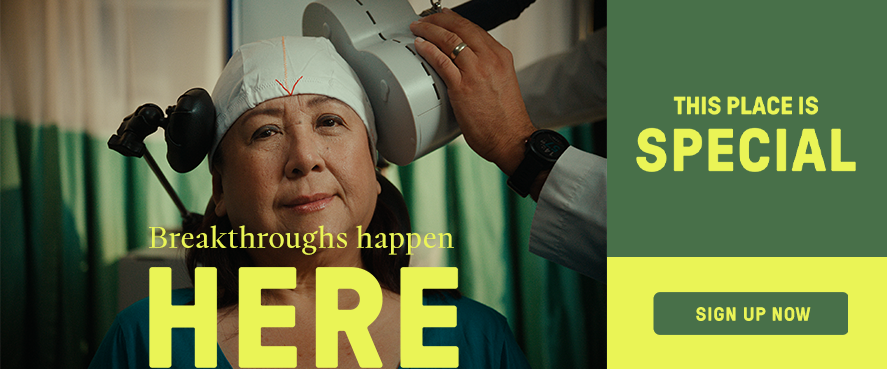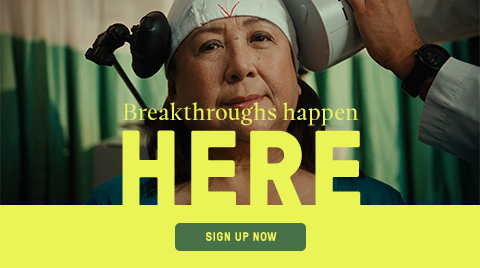Full media release
NEW CANADIAN-ISRAELI CANCER RESEARCH PROGRAM TO ADVANCE LESS TOXIC, LIFE-EXTENDING CHEMOTHERAPY TREATMENTS
TORONTO (November 12, 2013) - Leading-edge scientists Dr. Robert Kerbel of Sunnybrook Health Sciences Centre and Dr. Yuval Shaked of Technion (Israel Institute of Technology) today launched a collaborative international research program to help bring more effective and less toxic cancer drug therapies into the mainstream.
The unique global partnership aims to get a better understanding of why "less can be more" when it comes to chemotherapy, which is traditionally delivered through high doses of toxic anti-cancer drugs, usually given every few weeks for up to five months.
Dr. Kerbel and Dr. Shaked are at the forefront of a promising treatment strategy - known as metronomic chemotherapy - that has fewer side effects and may extend survival of patients with cancers that spread aggressively. Unlike traditional chemotherapy, metronomic chemotherapy uses lower and less toxic doses that are delivered more frequently, even daily, over prolonged periods (for instance, more than a year).
"Traditional chemotherapy remains one of the main treatment methods for cancer, yet it has considerable side-effects. And for patients with aggressive cancers, the treatment usually doesn't extend life expectancy very much," says Dr. Kerbel, a senior scientist at Sunnybrook Research Institute (SRI) and the Canada Research Chair in Tumour Biology, Angiogenesis and Antiangiogenic Therapy.
"In preclinical research, my laboratory has developed quite effective metronomic chemotherapy treatments for aggressive metastatic cancers - used either on their own or in combination with drugs called angiogenesis inhibitors, which cut off the blood supply that feeds tumours," he adds.
In recent and ongoing international randomized clinical trials of metronomic chemotherapy, the first clinical evidence of the treatment's promise is now being demonstrated. Large studies are underway among metastatic colorectal and breast cancer patients around the world.
However, to spur additional and much-needed clinical trials - and to move metronomic chemotherapy from a niche concept to a widely-used therapy - the medical oncology world needs a better understanding of the biological mechanisms the treatment uses to attack cancers.
"This knowledge gap is precisely what our Canadian-Israeli research partnership will target," says Dr. Shaked, who worked in Dr. Kerbel's SRI laboratory as a postdoctoral fellow and is now an associate professor with the Rappaport Faculty of Medicine at Technion in Haifa, Israel.
"Dr. Kerbel's research laboratory and my lab will work together closely - making use of one another's expertise - to tackle several aspects of how metronomic chemotherapy acts against cancer cells," Dr. Shaked says.
"This will include preclinical studies to determine whether this method can target the reactive host response usually found after conventional chemotherapy, thereby delaying tumour relapse, in addition to the ability of metronomic chemo to act against tumour cells that are usually resistant to conventional therapy."
Through a generous donation from Michael and Rena Buckstein, Sunnybrook Foundation and Israel Cancer Research Fund (ICRF) are partnering to fund this innovative Canadian-Israeli program.
"Their investment is supporting fundamental research that may ultimately lead to the widespread use of metronomic chemotherapy," says Dr. Jon Dellandrea, president & CEO of Sunnybrook Foundation. "This may extend survival and increase quality of life for patients with aggressive cancers."
Joy Wagner Arbus, ICRF's executive director, describes the partnership between ICRF and Sunnybrook as unique. "This collaborative research is a first for ICRF Toronto. We're excited to be working together in a novel way - one that makes the best use of metronomic chemotherapy expertise in Canada and Israel," Wagner Arbus says.
-30-
Sunnybrook Health Sciences Centre is inventing the future of health care for the 1.2 million patients the hospital cares for each year through the dedication of its more than 10,000 staff and volunteers. An internationally recognized leader in research and education and a full affiliation with the University of Toronto distinguishes Sunnybrook as one of Canada's premier academic health sciences centres. Sunnybrook specializes in caring for high-risk pregnancies, critically-ill newborns and adults, offering specialized rehabilitation and treating and preventing cancer, cardiovascular disease, neurological and psychiatric disorders, orthopaedic and arthritic conditions and traumatic injuries. The Hospital also has a unique and national leading program for the care of Canada's war veterans. For more information about how Sunnybrook is inventing the future of health care please visit us online at www.sunnybrook.ca
Israel Cancer Research Fund (ICRF) is one of the largest sources of private funds for innovative cancer research in Israel. ICRF has contributed more than U.S. $50 million for over 2,000 research grants involving all major hospitals, universities and cancer research projects throughout Israel. ICRF's mission is to continue to find treatments and cures for all forms of cancer, utilizing the unique benefits Israel and its scientists have to offer. The results of the research have a significant impact in Toronto, across Canada, and throughout the world. Learn more at www.ICRF.ca
For media inquiries, please contact:
Natalie Chung-Sayers, Communications Advisor
Sunnybrook Health Sciences Centre
Phone: 416-480-6100 ext. 2250
natalie.chung-sayers@sunnybrook.ca
Joy Wagner Arbus, Executive Director
Israel Cancer Research Fund
Phone: 416-480-9138
joy.wagner@icrf.ca










